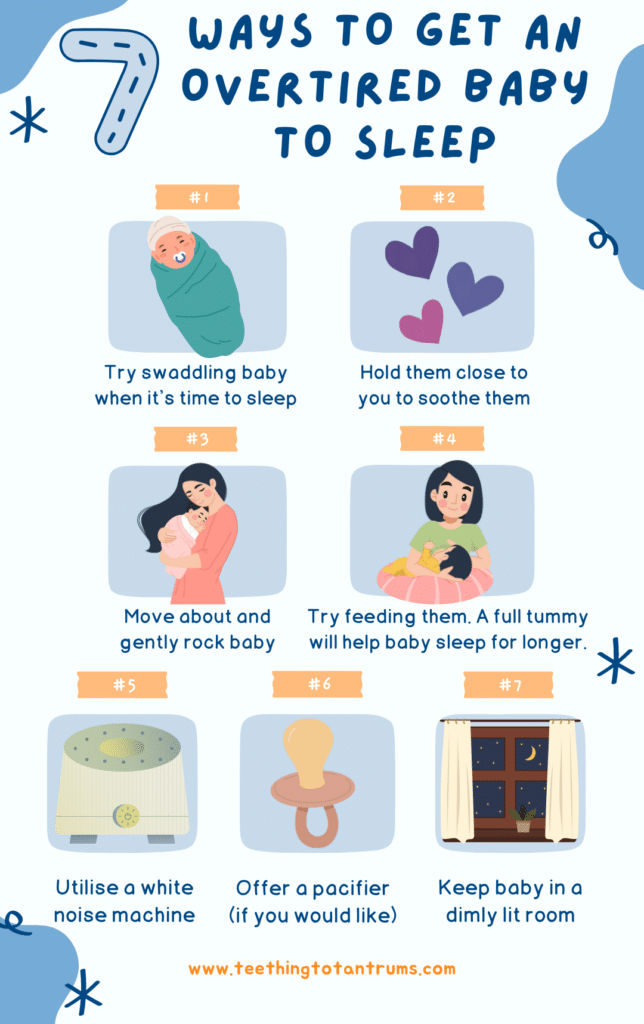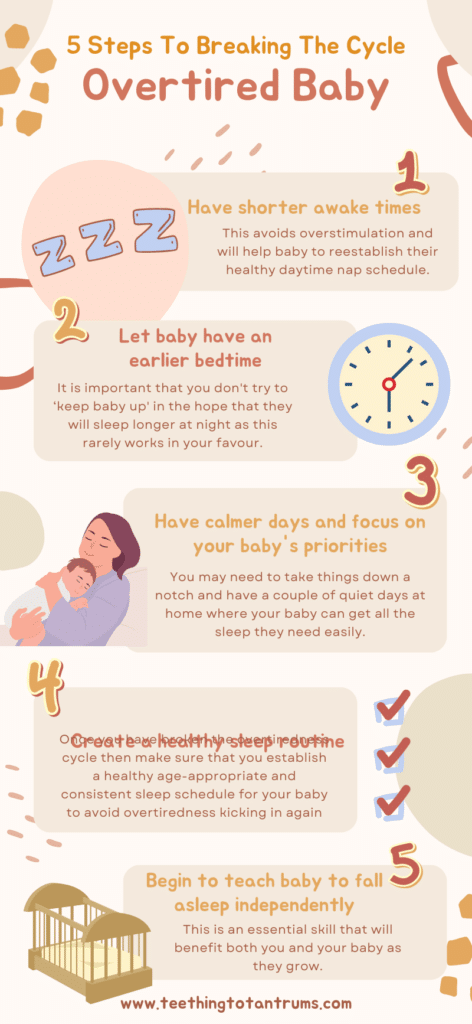Any parent will tell you that navigating the delicate balance of deciphering a baby’s sleep patterns is tricky enough to master without having a curveball of an overtired baby crisis thrown into the mix.
So, what are the signs you have an overtired baby? What are the solutions and steps to take to break the overtired cycle before it becomes engrained and how can we prevent babies from getting overtired in the first place?
Why Do Babies Get Overtired?
Simply put, babies get overtired because we don’t act on their sleep cues. If we misread baby’s cues then they can easily become overstimulated which often results in them missing essential naps or going to bed a little too late.
Signs Of An Overtired Baby
Common signs that you have an overtired baby are:
- Squirming
- Arching back
- Easily frustrated and irritable
- Difficult to soothe
- Fitful naps
- Falling asleep while feeding or not feeding well
If you suspect your baby is overtired, it’s imperative you act quickly to avoid getting stuck in a vicious cycle of your baby fighting sleep.
What Does It Mean To Have An Overtired Baby?
When your baby is overtired they experience a stress response which triggers the release of cortisol and adrenaline… Which, ironically and counterproductively, makes it difficult for your little one to settle and sleep as their heart rate and blood pressure increase.
This is why it is so common for tired babies to fight sleep.
The bad news is that once your baby is overtired, it can be very difficult to get them to sleep, despite the fact that they desperately need to do so.
It’s a weird phenomenon I know… but sleep really does breed sleep.
Therefore, it is imperative that you learn to spot your baby’s sleep cues and act swiftly.
Looking to get your little one to sleep quickly and effortlessly? Check out my Bedtime and Nap Cheat Sheet and master the art of making daytime naps and bedtimes as seamless as possible.
A bedtime & nap cheat sheet so good your little one will ask you to put them to bed...
Laura Williams "This is a life saver! I'm so glad I downloaded your bedtime & nap cheat sheet. My little one actually asked me to put him to bed last night! Unbelievable! Thank you so much!"
Click Here For The FREE Cheat Sheet
Baby’s Sleep Cues
Babies have three stages of tiredness…
- The “I’m sleepy” stage,
- The “I need-to-sleep-right-now” stage,
- And finally, the “I’m overtired!” stage.
There is a fine line between needing to sleep and becoming overtired so it is useful to know what to look out for. So, these are baby’s sleep cues you need to be aware of:
- Rub their eyes and yawn
- Start to fuss and whimper
- Pull at their ears
- Suck their fingers
- Have jerky movements
- Turn their head away
- Have a fixed stare, often looking into space
- Clenched fists
However, if we miss these subtle sleep signals… that’s when we need to know how to get an overtired baby to sleep.
How To Get An Overtired Baby To Sleep?
It will take patience and calm to get an overtired baby to settle. The aim is to calm them down to the point that they can fall asleep.
However, it is very common for overtired babies to wake frequently after settling… So, be prepared to go back and repeat these steps as often as it takes.

- Try swaddling. Swaddling using swaddles like these, is a very effective way to calm an overtired newborn. It prevents them from startling themselves with jerky arm and leg movements and makes them feel safe and secure.
- Hold them close. An overtired baby is a distressed baby. They need you to hold them close and comfort them until they are calm enough to fall asleep. So offer lots of love, soothing noises and cuddles.
- Move about. Rocking or walking around the room will often calm an exhausted baby so they are able to fall asleep.
- Feed them. Quite often, feeding an overtired baby can calm them down and help them nod off. A full tummy may help them stay asleep for longer too. Don’t worry too much about creating a negative sleep association right now… The aim is to break the overtiredness cycle first. You can handle sleep associations later with sleep training methods.
- Utilise a white noise machine. I am a great fan of the white noise machine. Baby-safe white noise machines are very calming and will help your baby settle… they also eliminate noises that may easily wake an overtired baby by playing soft music.
- Offer a pacifier. Although you may have to pop in to replace the pacifier when it falls out, using one on an overtired baby can work miracles.
- Keep baby in a dimly lit room. A dimly lit room that eliminates distractions is best when trying to settle an overtired baby.
If these tips do not encourage your baby to fall back into their regular sleeping habits, you are more than likely in the grips of a vicious overtired cycle. If that is the case, use the following steps to break this cycle and get back to healthy sleep habits once again.
How To Break The Cycle Of An Overtired Baby
Once your baby is overtired, you can find yourself in a cycle of less sleep, which leads to more overtiredness, which means your baby struggles to stay asleep and on it goes…
So, what can you do to break the cycle of an overtired baby?
Use the techniques for settling your baby to sleep I mentioned above ALONGSIDE the following…

Step 1 – Have Shorter Awake Times
Your overtired baby needs to consolidate their sleep to get back on track, so shorten the amount of time that they stay awake for a few days.
This avoids overstimulation and will help them to reestablish their healthy daytime nap schedule.
Don’t worry about them sleeping too much at this stage.
As long as they are waking for feeds, let them sleep and keep awake time in manageable doses.
Step 2 – Have An Earlier Bedtime
For a while, you may need to bring bedtime a little earlier.
This may mean they wake earlier in the morning, but treat this as a nighttime waking and keep things low key and hopefully, they will go back to sleep for a short while.
It is important that you don’t try to ‘keep baby up’ in the hope that they will sleep longer at night as this rarely works in your favour.
Remember what I said about sleep breeding sleep?
Step 3 – Have Calmer Days
You may need to take things down a notch and have a couple of quiet days at home where your baby can get all the sleep they need easily.
The best way to do this is just to stay close to home and concentrate on getting your little one out of that overtired cycle.
Their health and sleep are your priorities right now, so family visits and outings should wait.
Step 4 – Create A Healthy Sleep Routine
Once you have broken the cycle then make sure that you establish a healthy age-appropriate and consistent sleep schedule to avoid overtiredness kicking in again. I have included AAP-recommended age-appropriate sleep guidelines below.
Step 5 – Teach Your Baby To Fall Asleep Independently
Putting baby to bed and teaching them to self-settle and fall asleep independently can also help with avoiding overtiredness. This is an essential skill that will benefit both you and your baby as they grow.
Age-Appropriate Sleep Guidelines
As promised, here’s a guide for age-appropriate sleep to help your baby maintain a healthy sleep routine to keep them properly developing both physically and cognitively.
0-6 Weeks:
- Newborn babies require 16-20 hours of sleep per day
- Waking every 2-4 hours
- Length of time they’re able to stay awake: 30 mins to 1 hour
6-12 Weeks:
- 14-17 hours of sleep per day
- Length of time they’re able to stay awake: 45 mins to 2 hours
- Naps in the day lasting between 45 minutes and 2 hours
- The longest stretch of nighttime sleep: 3 to 6 hours
3-6 Months:
- 12-16 hours of sleep per 24-hour period
- 2–3 naps per day
- Length of time they’re able to stay awake: 1½ hours to 2½ hours
- Naps in the day lasting between 1 to 3 hours
- The longest stretch of nighttime sleep: 4 to 8 hours
6-9 Months:
- 10-12 hours of sleep per 24-hour period
- 2–3 naps per day
- Length of time they’re able to stay awake: 2 to 3 hours
- Naps in the day lasting between 1 to 3 hours
- The longest stretch of sleep at night: 5 to 10 hours
9-12 Months:
- 10-11 hours of sleep per day
- 2 naps per day
- Length of time they’re able to stay awake: 2 ½ to 3 ½ hours
- Naps in the day lasting around 1 to 2 hours
- The longest stretch of sleep at night: 10 to 12 hours
How To Prevent Baby From Getting Overtired
Prevention is always better than finding a cure.
Once your baby’s sleep habits are back on track, do the following to ensure you avoid having an overtired baby ever again.
- Ensure that your baby is having adequate age-appropriate daytime sleep. It can help to keep a sleep diary for a few days if you are struggling to work out how much sleep your baby is having/needs.
- Have a regular and healthy bedtime routine. Establishing a healthy and regular bedtime routine early on will teach your baby to get ready for sleep in a calm and relaxing way.
- Make the sleep environment conducive to sleep. Putting your baby to sleep in a dimly lit room without distractions will help to establish a healthy sleep routine. You can invest in a white noise machine and a soft night light, like this one to keep baby calm and make night feedings much easier too.
- Swaddle young babies. Swaddling helps your baby feel safe and secure and stops them from jerking awake from the Moro Reflex.
- Avoid overstimulation. An overstimulated baby will struggle to fall asleep, so keep stimulation and playtimes age-appropriate and not too energetic near sleep times. Young babies will not be able to manage long periods of stimulation.
- Differentiate between night and daytime interactions. It is important that your nighttime interactions are kept low-key to help your baby to resettle after feeding.
- Make sure your baby has had enough to eat before sleep. Try and make sure your baby has had a full feed before sleep to prevent them from waking from hunger. Dream feeds are a great hack to help babies sleep for as long as possible at night. To learn more about dream feeding, check out this post.
- Ensure your baby has plenty of physical exercise and tummy time. Physical activity during their wake windows is very important for babies and it will help them to sleep better. Make sure your baby has plenty of opportunities to kick their legs and offer regular tummy time sessions. If your baby is struggling with tummy time, read my post: Baby Hates Tummy Time to learn how to navigate this tricky situation.
- Get outside every day. Fresh air and natural light will help establish your baby’s circadian rhythm which in turn will help them to sleep better so make sure you get outside at least once a day. It will also do you the world of good too!
- Be aware of baby’s sleep cues. Recognising and acting on baby’s sleep cues will make a huge difference in avoiding having an overtired baby in the future. If baby needs to sleep… Let them. Keeping baby awake until their nap time will only end in disaster as their bodies produce the stress hormones, adrenaline and cortisol, to fight their tiredness.
TOP TIP: If you are out and about when baby would normally nap, let your baby sleep wherever they are and DO NOT try and keep them to stay awake until you get home. The occasional nap in the stroller or car seat is absolutely fine and certainly preferable to an overtired baby.
Need More Parenting Help?
- Download our FREE Bedtime & Nap Sleep Cheat Sheet. It’s a free, easy-to-use and proven formula designed for parents of 0-5 year olds to master the art of consistently undisturbed and restful sleep without the yelling, nagging or exhausting long-winded evenings.
- Check out our Parenting Toolbox. You’ll get access to expertly-chosen products that you can guarantee are the best for your little one and your wallet.
- Are you looking for personalized guidance to navigate the challenges of parenting? I offer 1-on-1 consultations to bring you tailored strategies and actionable advice to help support your child's growth and well-being with confidence.

A bedtime & nap cheat sheet so good your little one will ask you to put them to bed...
Laura Williams "This is a life saver! I'm so glad I downloaded your bedtime & nap cheat sheet. My little one actually asked me to put him to bed last night! Unbelievable! Thank you so much!"
Click Here For The FREE Cheat Sheet


